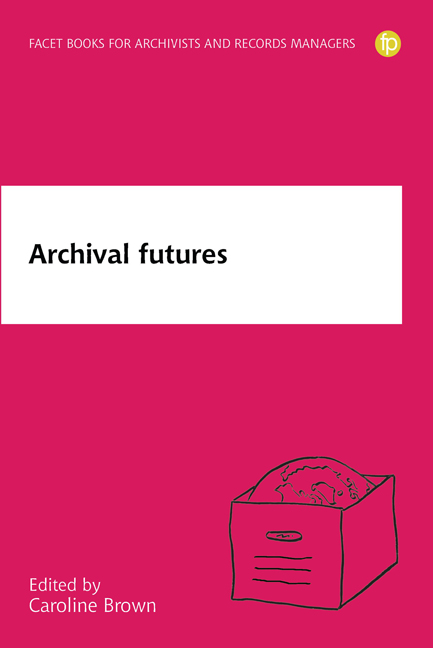Book contents
- Frontmatter
- Dedication
- Contents
- Notes on contributors
- Introduction
- 1 It's the end of the archival profession as we know it, and I feel fine
- 2 Whose truth? Records and archives as evidence in the era of post-truth and disinformation
- 3 The future of archives as networked, decentralised, autonomous and global
- 4 Can we keep everything? The future of appraisal in a world of digital profusion
- 5 Frames and the future of archival processing
- 6 Access technologies for the disruptive digital archive
- 7 Multiple rights in records: the role of recordkeeping informatics
- 8 The accidental archive
- 9 The end of archival ideas?
- Index
7 - Multiple rights in records: the role of recordkeeping informatics
Published online by Cambridge University Press: 01 June 2019
- Frontmatter
- Dedication
- Contents
- Notes on contributors
- Introduction
- 1 It's the end of the archival profession as we know it, and I feel fine
- 2 Whose truth? Records and archives as evidence in the era of post-truth and disinformation
- 3 The future of archives as networked, decentralised, autonomous and global
- 4 Can we keep everything? The future of appraisal in a world of digital profusion
- 5 Frames and the future of archival processing
- 6 Access technologies for the disruptive digital archive
- 7 Multiple rights in records: the role of recordkeeping informatics
- 8 The accidental archive
- 9 The end of archival ideas?
- Index
Summary
Introduction
The purpose of this chapter is to provide an introduction to a paradigm shift in ways of thinking about current recordkeeping environments. We begin by explaining recordkeeping informatics, a continuum-based approach to managing authoritative information in the ever shifting, complex and technologically challenging times that confront all of us, including organizations.
We then develop these ideas through a case study of recordkeeping requirements for those who as children experience out-of-home care as a result of child welfare and protection policies. Out-of-home care is the term used in Australia for ‘the care of children and young people up to 18 years who are unable to live with their families, often due to child abuse and neglect. It involves the placement of a child or young person with alternate caregivers on a short- or long-term basis’ (Australian Institute of Family Studies, 2015). These experiences place lifelong identity, memory and accountability needs on the governments and organizations providing these services. Our case study will explore the macro and micro challenges that arise for individuals, organizations, governments and societies as a demonstration of the utility of recordkeeping informatics in designing archival futures in which multiple rights in records are embedded.
Recordkeeping informatics
The development of recordkeeping informatics has been underway for the past eight years. The original motivation for this work was the need for an up-to-date textbook based on records continuum thinking to support teaching and learning for contemporary recordkeeping. The second edition of Jay Kennedy and Cherryl Schauder's Records Management: a guide to corporate record keeping (1998), is the only title currently in print to fit the bill, but its publication date means that the content, although still valid, is inevitably dated. During our first meeting to discuss the outline of an updated text, it became clear that it would not be possible to address contemporary recordkeeping requirements adequately within the constraints of what had developed as a discipline and occupation in the paper world.
The definition of informatics that we use explains the discipline as ‘the science of information. It studies the representation, processing, and communication of information in natural and artificial systems. Since computers, individuals and organizations all process information, informatics has computational, cognitive and social aspects’ (Fourman, 2003, 237–8).
Information
- Type
- Chapter
- Information
- Archival Futures , pp. 99 - 116Publisher: FacetPrint publication year: 2018
Accessibility standard: Unknown
Why this information is here
This section outlines the accessibility features of this content - including support for screen readers, full keyboard navigation and high-contrast display options. This may not be relevant for you.Accessibility Information
- 2
- Cited by
